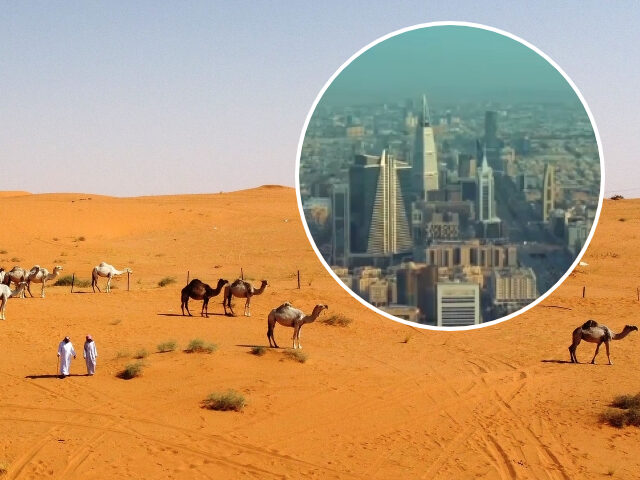A Saudi human rights NGO reported on Monday that the Specialized Criminal Court in Saudi Arabia had sentenced three men to death this month for “refusing to be evicted” from the northern site the government has proposed for the building “Neom,” a nine-million-person mega-city to be anchored by a 75-mile-long skyscraper.
The NGO ALQST identified the men as Shadli, Ibrahim, and Ataullah al-Huwaiti, members of the indigenous Huwaitat tribe that live on the land Crown Prince Mohammed Bin Salman, known commonly as MBS, has chosen for the construction of Noem. The men are part of a greater movement to protect the Bedouin communities in the area from the massive development planned for the area.
Neom is the flagship project of what MBS, the de facto ruler of the country, has branded “Vision 2030,” an ambitious plan to diversify the Saudi economy to move it away from oil. Saudi promotions claim that, once completed, Neom will be a “zero-carbon” city in which the country’s fundamentalist sharia laws will not apply and locals will be able to drink alcohol and live relatively secular lives. Saudi officials have advertised Neom as being a project built on “virgin” land, disregarding the existence of the Huwaitat people.
The flagship construction of Neom is set to be the “Mirror Line,” or “Line,” a skyscraper housing its own “smart” ecosystem in which residents will allegedly not have to walk more than five minutes to reach any amenity or ever leave the building for any reason. Planners claim that five million of Neom’s anticipated nine million residents will live there and that the entire city will cost $500 billion to build. Saudi officials have not clarified, or addressed in any way, how they intend to protect the civil rights of “Mirror Line” residents who will be “liberated” from cars or other transportation that they control and do not appear to have any easy access to the outside world.
Outside of the Neom proposals themselves, the planned city has caused years of strife for Huwaitat tribe members, who have faced forced evictions and state violence in response to their resistance to being displaced.
According to ALQST, a Saudi court sentenced three Huwaitat men to death on October 2 on the grounds of refusing eviction. At least one of the men, it claimed, was tortured in state custody.
“On 23 May 2022, Shadli [al-Huwaitat] went on hunger strike in protest against ill-treatment and being placed in solitary confinement, and after two weeks the Dhahban Prison administration inserted a tube into his stomach to force-feed him, a form of torture,” ALQST asserted.
The three convicted men reportedly organized exchanges with government commissions seeking to stop their evictions and published videos online condemning the Saudi government for “the misery his family and all the other displaced residents were facing as a result of the decision to evict them.”
There are an estimated 20,000 members of the Huwaitat community, most of which will have to vacate their ancestral homelands to make room for the robot-powered, green-centric desert “mega-city.” Huwaitat tribe members have been protesting forced evictions since at least 2020, when they urged the United Nations to get involved in their defense.
“For the Huwaitat tribe, Neom is being built on our blood, on our bones,” Huwaitat activist Alia Hayel Aboutiyah al-Huwaiti told the Guardian in 2020. “It’s definitely not for the people already living there! It’s for tourists, people with money. But not for the original people living there.”
The issue attracted international attention at the time because of the government killing of Abdul Rahim al-Huwaiti, one of the most vocal opponents of the Neom displacements and Shadli al-Huwaiti’s brother. Abdul Rahim al-Huwaiti had taken to using social media and Youtube videos to report on alleged government abuses of his tribe in the region before security officers shot him dead in his home.
“They have begun the process of removing people, beginning with surveying homes with the intent of removing people and deporting them from their land,” Abdul Rahim al-Huwaiti denounced in one of his final videos, according to a translation by the Guardian. “They arrested anyone who said they’re against deportation, they don’t want to leave, they want to remain [in] their homes, that they don’t want money.”
Saudi officials have yet to comment publicly on the recent rulings against the Huwaitat tribesmen at press time. Neom’s official social media arms have continued to promote the promised city through the scandal and through multiple reports that the project’s outrageous promises are impossible.
A Bloomberg expose on the project published in July found that MBS is pouring lavish amounts of money into salaries for “consultants” and other experts but potentially not receiving much constructive feedback.
“According to more than 25 current and former employees interviewed for this story, as well as 2,700 pages of internal documents, the project has been plagued by setbacks, many stemming from the difficulty of implementing MBS’s grandiose, ever-changing ideas,” Bloomberg noted, “and of telling a prince who’s overseen the imprisonment of many of his own family members that his desires can’t be met.”
One former worker on the Neom project described a state of “complete absence of being tethered to reality” in the approach to the city; others mentioned that MBS had specifically mentioned “cyberpunk” as an aesthetic inspiration for one of the main tourism sectors.
MBS spoke to Bloomberg for that project and excitedly described the ability to create an entirely new legal system without any citizen demands – clearly failing to acknowledge the existence of the Huwaitat.
“Imagine if you are the governor of New York without having any public demands,” MBS said. “How much would you be able to create for the companies and the private sector?”

COMMENTS
Please let us know if you're having issues with commenting.